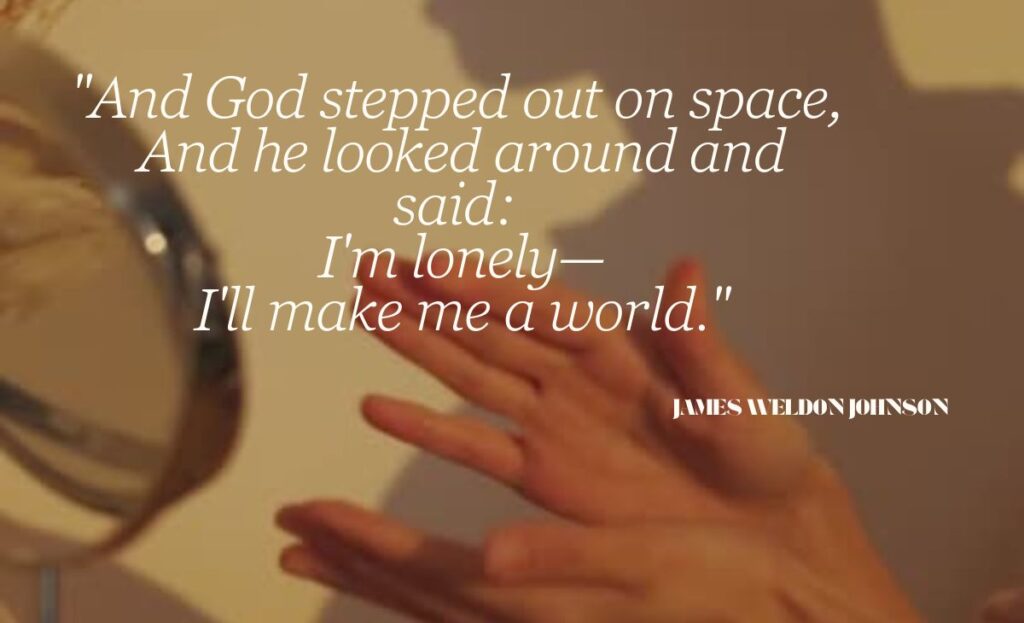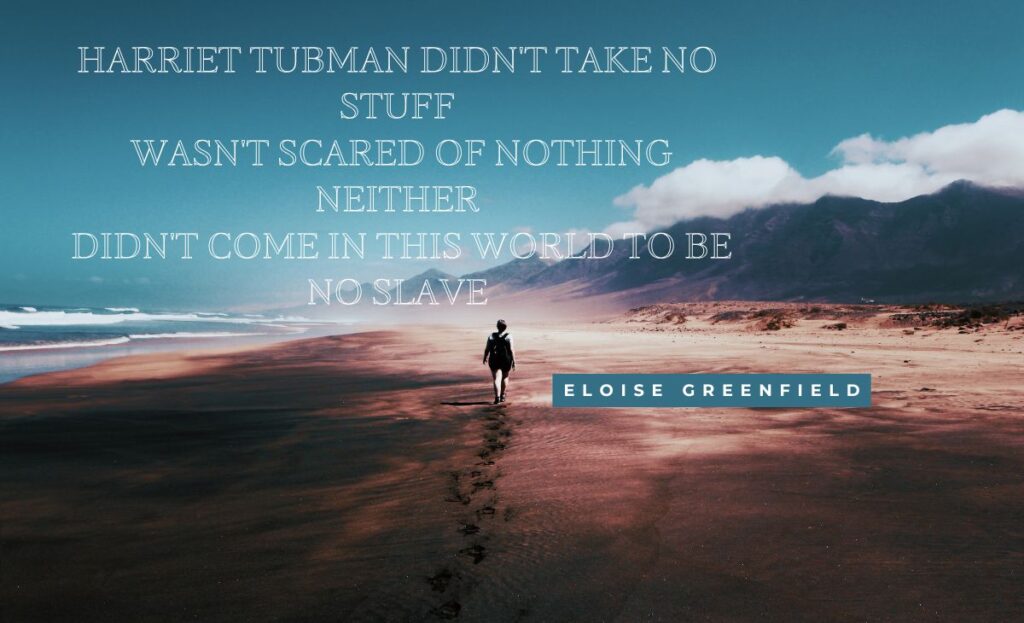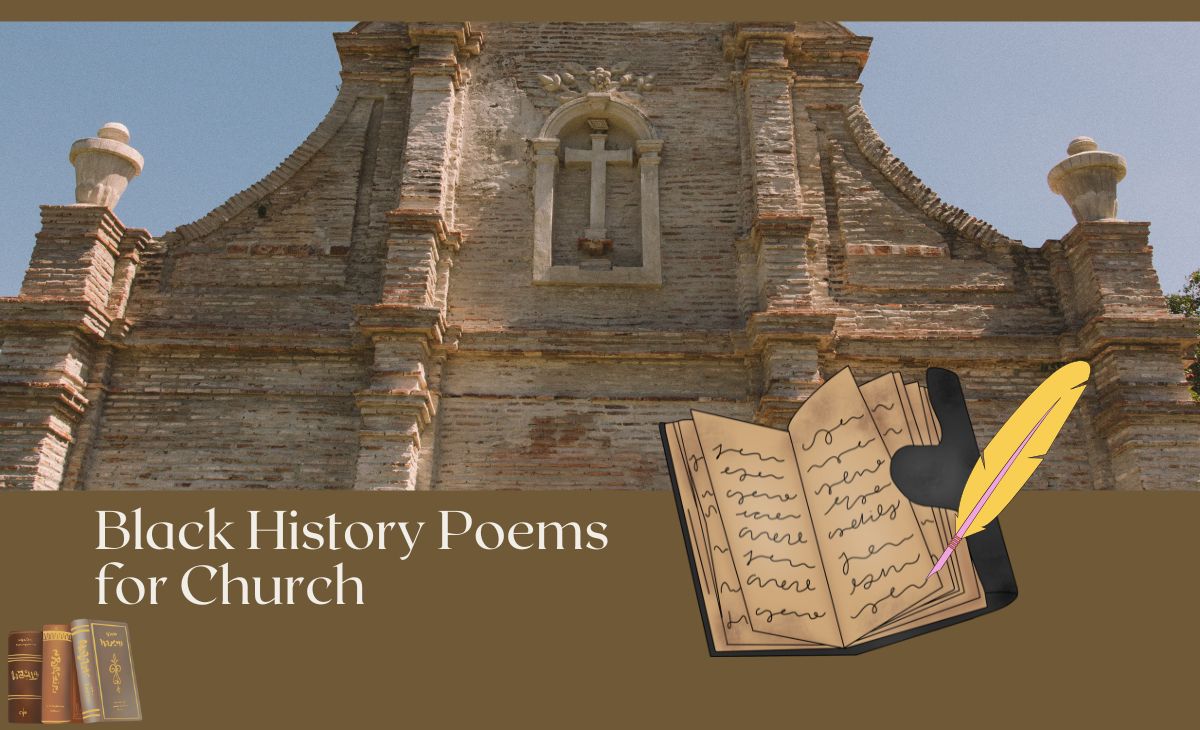Poetry has always held a sacred place in worship, and Black history poems offer churches a powerful way to honor African American heritage while enriching spiritual experiences.
These carefully selected poems for church services celebrate faith, resilience, and the enduring spirit of the Black community.
Whether you’re planning Black History Month church programs or seeking year-round inspiration, these works connect historical struggles with contemporary faith journeys in meaningful ways.
The Creation by James Weldon Johnson

“And God stepped out on space,
And he looked around and said:
I’m lonely—
I’ll make me a world.”
This masterful retelling of the Genesis creation story uses African American vernacular and imagery to make the biblical narrative accessible and deeply moving. Johnson’s poem transforms the creation account into a dramatic monologue that resonates powerfully in church settings, especially during services focused on God’s creative power and divine purpose.
Go Down, Moses (Traditional Spiritual)
“Go down, Moses,
Way down in Egypt’s land;
Tell old Pharaoh
To let my people go.”
This freedom spiritual served as both worship song and coded message during slavery, connecting the Israelites’ liberation with African Americans’ yearning for freedom. Churches can use this powerful poem to explore themes of deliverance, justice, and God’s intervention in human suffering, making it perfect for services addressing social justice issues.
Phenomenal Woman by Maya Angelou
“Pretty women wonder where my secret lies.
I’m not cute or built to suit a fashion model’s size
But when I start to tell them,
They think I’m telling lies.”
Angelou’s celebration of inner strength and dignity speaks to the divine worth of every woman. This empowering poem works beautifully in Women’s Day services or any gathering focused on self-worth, confidence, and recognizing the phenomenal nature of God’s creation in each person.
Dreams by Langston Hughes

“Hold fast to dreams
For if dreams die
Life is a broken-winged bird
That cannot fly.”
Hughes’ simple yet profound message about perseverance and hope connects beautifully with Christian themes of faith and vision. This accessible poem works well with youth ministries and services focused on maintaining hope during difficult times, encouraging congregations to hold onto their God-given dreams and purposes.
Still I Rise by Maya Angelou
“You may write me down in history
With your bitter, twisted lies,
You may trod me in the very dirt
But still, like dust, I rise.”
This powerful anthem of resilience and triumph over adversity speaks to the Christian message of overcoming through faith. The poem’s repetitive “I rise” refrain creates opportunities for congregational participation and works exceptionally well in services about perseverance, victory over circumstances, and the resurrection power available to believers.
The Negro Speaks of Rivers by Langston Hughes
“I’ve known rivers:
I’ve known rivers ancient as the world and older than the
flow of human blood in human veins.
My soul has grown deep like the rivers.”
Hughes connects the ancient wisdom and enduring strength of African heritage with spiritual depth. This contemplative poem works beautifully in baptism services or meditative worship settings, as it speaks to the deep, flowing nature of both cultural heritage and spiritual life that runs through generations.
Other Post: 22 Best Poems of All Time: Timeless Verses That Shaped Literature
We Wear the Mask by Paul Laurence Dunbar
“We wear the mask that grins and lies,
It hides our cheeks and shades our eyes,—
This debt we pay to human guile;
With torn and bleeding hearts we smile”
Dunbar’s honest exploration of hidden pain and authentic versus performed identity resonates with Christian themes about being genuine before God. This poem opens important conversations about mental health, authenticity, and the church’s role in creating safe spaces where people can remove their masks and find healing.
If We Must Die by Claude McKay
“If we must die, let it not be like hogs
Hunted and penned in an inglorious spot,
While round us bark the mad and hungry dogs,
Making their mock at our accursed lot.”
McKay’s call for dignity in the face of persecution connects with Christian themes of martyrdom and standing firm in faith. While addressing difficult topics, this poem works in memorial services or when discussing the courage required to live authentically as believers in challenging circumstances.
Rosa Parks by Nikki Giovanni
“This is for the Pullman Porters who organized when people said
they couldn’t. And carried the Pittsburgh Courier and the Chicago
Defender to the South so that people would know they were
not alone”
Giovanni’s tribute celebrates quiet courage and everyday heroism, connecting Parks’ famous act of defiance with Christian principles of standing for justice. This poem works well in services about moral courage, leadership, and how ordinary people can make extraordinary differences when guided by conviction and faith.
Martin Luther King Jr. by Gwendolyn Brooks
“A man went forth with gifts.
He was a prose poem.
He was a tragic grace.
He was a warm music.”
Brooks’ lyrical tribute to Dr. King emphasizes his prophetic calling and peaceful approach to social change. This poem fits naturally into MLK Day services and discussions about Christian leadership, social justice, and how faith calls believers to work for peace and equality in their communities.
Harriet Tubman by Eloise Greenfield

“Harriet Tubman didn’t take no stuff
Wasn’t scared of nothing neither
Didn’t come in this world to be no slave
And wasn’t going out that way either”
Greenfield’s tribute to Tubman’s fearless leadership and commitment to freedom connects with Christian themes of liberation and serving others. This poem works well in Women’s History Month services and discussions about how faith motivates people to risk everything to help others find freedom and dignity.
Frederick Douglass by Robert Hayden
“When it is finally ours, this freedom, this liberty, this beautiful
and terrible thing, needful to man as air,
usable as earth; when it belongs at last to all,
when it is truly instinct, brain matter, diastole, systole”
Hayden’s complex portrait of Douglass emphasizes education, self-improvement, and the connection between knowledge and freedom. This sophisticated poem works well in adult education ministries and services focused on personal growth, learning, and breaking free from limitations through knowledge and faith.
Blessing the Boats by Lucille Clifton
“may you in your innocence
sail through this to that
may you in your innocence
sail through this to that”
Clifton’s gentle blessing speaks to new beginnings and trusting divine guidance during transitions. This beautiful poem works perfectly in graduation services, life transition ceremonies, and any worship setting focused on stepping into new seasons with faith and divine protection.
The Hill We Climb by Amanda Gorman
“When day comes we ask ourselves,
where can we find light in this never-ending shade?
The loss we carry,
a sea we must wade”
Gorman’s inaugural poem offers hope and unity for the future while acknowledging present struggles. This contemporary work connects with Christian themes of perseverance, working together, and building God’s kingdom on earth. It works well in New Year services and gatherings focused on community building and social healing.
Brown Girl Dreaming by Jacqueline Woodson
“I am born on a Tuesday at University Hospital
Columbus, Ohio,
USA—
a country caught”
Woodson’s memoir in verse celebrates childhood faith and family traditions, making it perfect for intergenerational worship and services celebrating family heritage. These accessible poems help churches explore how faith is passed down through generations and how childhood experiences shape spiritual development.
The Tradition by Jericho Brown
“Aster. Nasturtium. Delphinium. We thought
Fingers in dirt meant it was our dirt, learning
Names in heat, in elements classical
Philosophers said could change us.”
Brown’s contemporary poetry addresses modern struggles while connecting to timeless themes of growth and transformation. This sophisticated work fits well in adult discussion groups and services that tackle complex issues facing today’s church, bridging ancient wisdom with contemporary challenges.
American Sonnet by Terrance Hayes
“The golden shovel is a poetic form Hayes created where the last word
of each line comes from lines taken from another poem,
creating a new work while honoring the original.”
Hayes’ innovative poetry explores complex identity and modern faith questions. These intellectually challenging works suit academic church communities and literary appreciation groups, offering sophisticated exploration of what it means to be both American and faithful in contemporary society.
These Black history poems for church services offer congregations powerful tools for worship, education, and community building. By incorporating these works into regular programming, churches can create more inclusive worship experiences while honoring the rich literary and spiritual traditions of the African American community.
Whether used during Black History Month church programs or throughout the year, these poems connect historical struggles with contemporary faith, creating bridges between past and present that strengthen and inspire modern believers.

I’m Chloe Eden, the heart behind ReverbLove.com. I Share Soulful Poems that touch Emotions, Inspire Hearts, and Celebrate Love. Words are My Art, and Poetry is My Passion.















